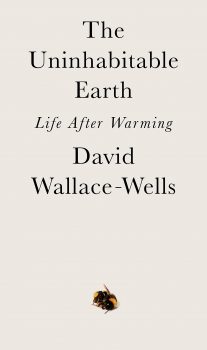The Uninhabitable Earth by David Wallace-Wells
Book review by Danielle Leonard

“It is worse, much worse than you think,” writes author David Wallace-Wells in the introductory paragraph of his book, The Uninhabitable Earth. The deputy editor for New York Magazine is referring to climate change and the impending disaster our earth faces whether we do anything about it, or not. While the impetus for the book is to wake humanity up to the shocking reality of our deteriorating habitat, it is also clear that there may be little we can do to stop its course.
With Earth Day’s 50th anniversary taking place April 22, it seemed fitting to dive into one of the latest books on climate change.
In it, Wallace-Wells explains, ‘this is not a book about the science of warming; it is about what warming means to the way we live on this planet.” Human activity is harshly implicated in the chaos that he says will soon descend on the earth due to climate change. Consider this: half the carbon emitted into the atmosphere by the burning of fossil fuels has happened in just the past three decades. Today, there is a third more carbon in the atmosphere than there has been at any point in the last 800,000 years.
It is impossible to read Wallace-Wells’ book without an increasing sense of doom, and frankly, that’s not the worst thing. The chapters offer a staggering level of scientific fact along with realistic scenarios that our species faces if we continue with our status – which is to do next to nothing about climate change. The Uninhabitable Earth explains the inevitability of the earth’s rising temperature – each one degree Celsius increase unleashing irreversible and devastating effects on our environment and, conequently, us. According to the research, we are on a trajectory to increase the world’s temperature by four degrees by the year 2100. The earth will likely survive, but will humans? This, he indicates, is less clear.
Is The Uninhabitable Earth a bleak read? Admittedly, yes. It is unforgivingly honest. In fact, Wallace-Wells tells the reader, almost two-thirds through the book, “if you have made it this far, you are a brave reader. Any one of these twelve chapters contains, by rights, enough horror to induce a panic attack in even the most optimistic of those considering it.”
I found reading the book to be both anxiety-inducing and overwhelming, but at the same time, necessary. While I consider myself a moderate environmentalist, I had little understanding of the urgency facing the planet and agree with the author’s assessment that political will is imperative to truly make a difference at this point in the game; individual efforts, alone, are not enough.
I recommend this book to anyone who has a stake in this planet. In other words, if you’re human, read it. The good news is that it’s not imperative to read its entirety to feel the weight of our collective burden. My hope, and I would imagine Wallace-Wells’ hope too, is to read just enough to act. And, please, do it soon.

